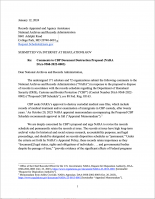- Comments
Council and Partners Oppose CBP's Proposal to Dispose of Medical Records of People in CBP Custody
Published
On January 12, the Council, along with the ACLU National Prison Project and the Texas Civil Rights Project, led efforts to oppose U.S. Customs and Border Protection’s (CBP) proposal to destroy records of medical treatment received by migrants in CBP custody. The records, which are maintained by the National Archives and Records Administration (NARA), cover information about medical history, physical condition, vaccinations, mental health, first-aid, and other medical treatment received by migrants in CBP custody, which include medical assessments, notes of patient encounters, medical summaries, patient refusal of treatment, recorded observations, health interviews, and questionnaires. CBP’s proposal would require NARA to destroy these records after 20 years. The letter to NARA opposing CBP’s proposed disposition schedule, which was signed by more than one hundred scholars and more than seventy organizations, highlighted the historical and legal significance of these records. The medical records provide an important historical perspective on how CBP treated migrants in its custody, as future generations may use them to study past policies. Permanently maintaining medical records may also prove crucial in future potential litigation, especially in cases where victims of mistreatment may have been minors or in wrongful death cases. Last year, the medical care offered by CBP and subcontractors to migrants in CBP custody came under scrutiny after a child died in CBP custody, and the agency deals with the fallout of her tragic death, as well as other migrant deaths that occurred on CBP's watch.
We can't let the government keep us in the dark.
Join us in demanding transparency and holding them accountable in court to protect our democracy.
Donate Now
